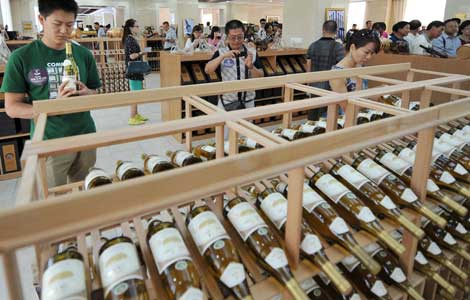Court sentences 56 for telecom scam
Updated: 2013-08-30 07:03
By Sun Li and Hu Meidong in Xiamen, Fujian (China Daily)
|
||||||||
|
Fifty-six people were sentenced at Xiamen Intermediate People's Court on Thursday in Fujian province on transnational telecom scam charges. The sentences ranged from 27 months to 12 years, along with fines of 2,000 yuan to 100,000 yuan ($327.00 to $16,300). Huang Rong / for China Daily |
Fifty-six people were sentenced at Xiamen Intermediate People's Court on Thursday for their involvement in a large transnational telecom scam.
The court said all of the defendants were arrested in 2011 in Cambodia, and most of them were poorly educated young people from the Chinese mainland. Their handlers were from Taiwan.
The sentences ranged from 27 months to 12 years in prison, along with fines of 2,000 to 100,000 yuan ($327.00 to $16,300).
The gang would telephone people on the Chinese mainland and pretend to be court or police officials, the court said.
More than 180 victims from 10 provinces, including Fujian, Guangdong, Jiangsu and Sichuan, were cheated out of 15.56 million yuan.
Li Zhiyuan, deputy chief justice of Xiamen Intermediate People's Court, said the case shows a lack of public awareness of phone scams.
The scammers usually would identify themselves as judicial or police officials and tell victims they were involved in a money-laundering or other economic case, Li said.
They would say the victims' bank accounts had been compromised and advised them to transfer their money to designated "safe" accounts.
"But the country's judiciary wouldn't handle such a serious matter simply by making a phone call. It would have a written notification," Li said.
Li said the number of telecom scams had risen in Xiamen. In 2011, the court dealt with 30 such cases, but in 2012, there were 36. This year seems well on the way to at least repeat that number with the court handling 24 cases in the first six months.
"Many victims panicked, and they forgot to check the facts. They didn't quite understand the legal procedures, and they didn't dare ask someone for advice. Because of these factors, they fell into the trap," Li said.
Sun Jungong, spokesman of the Supreme People's Court, said at the news conference after the trial, "Such types of phone frauds are increasing and sometimes they are alluring."
Other tricks include telling victims they won a lottery or prize, and using scams involving online shopping.
Sun said people should be suspicious of calls that ask for cash or fund transfers, and should not give out their bank details or passwords.
Thursday's verdict closed only part of a case that involves 598 suspects, including 186 from the Chinese mainland, who were arrested across Southeast Asia.
Since 2011, police on the mainland have worked with police in Taiwan, as well as in Cambodia, Indonesia, Malaysia and Thailand to launch a joint investigation into the massive telecom scam.
Investigators found a Taiwan phone-fraud gang had set up a string of calling bases in Cambodia and recruited the defendants by offering free airline tickets, food, lodging and salaries since February 2011.
Wang Feng, an official at the criminal investigation bureau of the Ministry of Public Security, which handled the case, said the scammers went through formal training and were divided into three groups to assume different roles when calling their victims.
Some other divisions of the gang were responsible for network maintenance and money transfers and laundering, Wang added.
Most of the gang's computer servers were outside the Chinese mainland, and the swindlers used disguised phone numbers that matched those of public security bureaus or courts when they called from overseas. That added to the difficulty of gathering solid evidence during the investigation, he said.
sunli@chinadaily.com.cn
(China Daily USA 08/30/2013 page3)
- Chang calls for closer ties with ASEAN members
- 'Don't flaunt ASEAN banner' on the S. China Sea issue
- Obama makes case for Syria strike, British house votes no
- Russian Navy to rotate warships in Mediterranean
- UN should continue chemical weapons probe: Russia
- Envoy in DPRK to seek release of US citizen

 Jeremy Lin's campaign of animal protection
Jeremy Lin's campaign of animal protection
 Solar panel maker hits milestone
Solar panel maker hits milestone
 Vineyards pour billions into chateaus
Vineyards pour billions into chateaus
 Fair brings Hami melons to Beijing
Fair brings Hami melons to Beijing
 Court sentences 56 for telecom scam
Court sentences 56 for telecom scam
 Foreigners given opportunities to shine
Foreigners given opportunities to shine
 US vows action in Syria even without UN backing
US vows action in Syria even without UN backing
 Li Na advances to 3rd round
Li Na advances to 3rd round
Most Viewed
Editor's Picks

|

|

|

|

|

|
Today's Top News
Google executive to aid Xiaomi's growth
UK parliament rejects Syria strike
Visa issues resolved in new policy
Solar panel maker hits milestone
Xi calls for innovation push
Tougher environment takes toll on bank results
Trending news across China
Vineyards pour billions into chateaus
US Weekly

|

|







